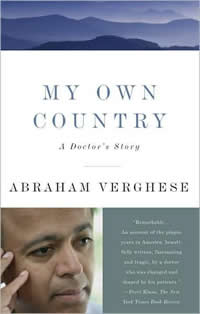Book Notes
 Abraham Verghese, My Own Country: A Doctor’s Story of a Town and Its People in the Age of AIDS (New York: Simon and Schuster, 1994), 352pp.
Abraham Verghese, My Own Country: A Doctor’s Story of a Town and Its People in the Age of AIDS (New York: Simon and Schuster, 1994), 352pp.
A guest review by Katie Finlay.
In the 25 years since the AIDS epidemic began its deadly march through human history, we may have forgotten the way things were at the beginning: the incomplete knowledge of the disease, the lack of any effective treatment, the prejudice against the infected. Abraham Verghese wrote of his experience as the sole infectious disease physician in his area of eastern Tennessee. A lovely, semi-rural foothills area, Johnson City was the place young men left for big-city life on the coasts. They made their way back there in the early 1980’s, sick with the disease that caused fever, weakness, cancerous sores, rapid weight loss, and, inevitably, death.
Dr. Verghese is a gifted writer who creates detailed, full-color portraits of his patients, carrying the reader beyond the stereotypes they may have of gay men, hillbillies, hemophiliacs, and church ladies. He also reflects on how his identity as a foreigner both aided and hindered his medical practice in that area (he was born of Indian parents and raised in Ethiopia). His book is a very personal memoir, weaving the story of his frustration at losing patients to death and his deteriorating marriage into the story of the medical details of the illnesses and the community’s responses. Ignorance and fear of transmission caused locals to condemn and shun the infected. Christian faith is shown in a three-dimensional light, not only with accounts of people sneering that the disease is “God’s punishment,” but also with accounts of how faith in God gave people courage to face a terrible death or provided compassion to care for the sick. His account reminds us that the current-day HIV/AIDS situation in parts of Africa is similar: limited medical resources, fear and prejudice, faith and dignity.


